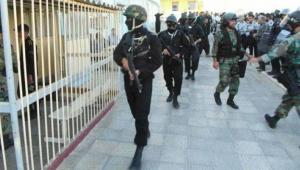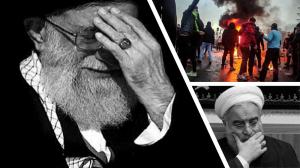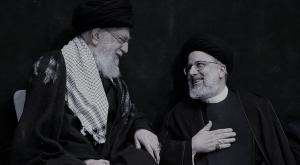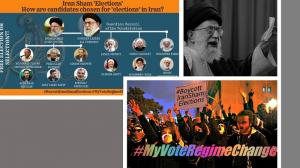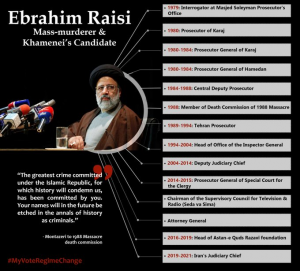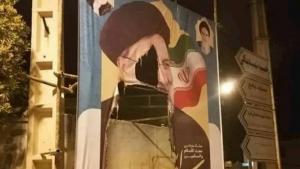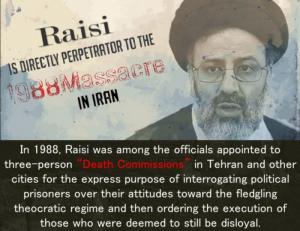
Ebrahim Raisi, a member of the 1988 Massacre’s “Death Commission” assigned as the highest judicial position within the regime.
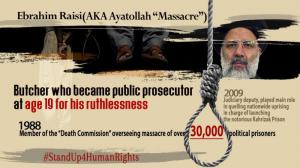
Ebrahim Raisi, the henchman of the 1988 massacre, one of the worst criminals against humanity, will be the regime’s next president.
In February 2020 and again last month, the widespread anti-government sentiment found another outlet in the form of electoral boycotts.
In 2017 and 2018, residents of more than 100 Iranian cities and towns took part in simultaneous protests which challenged the entire ruling system and popularized slogans like 'Death to the dictator.'”
PARIS, FRANCE, July 5, 2021 /EINPresswire.com/ -- The Iranian regime is presently on the verge of adopting a law that would further expand the regime?s already vast capacity to crack down on dissent. On June 8, the parliament passed a draft bill that establishes the death penalty as an accepted legal punishment for ?collaborating with enemy states? ? a charge often levied against activists who challenge the ruling system. The bill also explicitly criminalizes the act of filming or photographing crime scenes or any number of incidents involving death or serious injury. — NCRI
The draft?s passage preceded the Iranian regime?s presidential election in just ten days and came at a time when there was little doubt about what the outcome of that election would be. On June 18, it was confirmed that the Iranian regime?s next president would be the current judiciary chief and well-known human rights abuser Ebrahim Raisi. The pending legislation can therefore be viewed as part of a broad effort to perpetuate Raisi?s brutal legacy.
In 1988, Raisi was the deputy public prosecutor for Tehran. In the summer of that year, he was given a seat on the ?death commission? responsible for implementing a fatwa against the Mojahedin-e-Khalq (MEK) in the nation?s capital. In that capacity, he quickly became one of the greatest contributors to a massacre that would ultimately claim over 30,000 lives throughout the country. In the aftermath, Raisi repeatedly reaffirmed his status as one of Iran?s leading proponents of corporal and capital punishment, as well as defending the massacre and the supreme leader?s call for merciless treatment of its main target, the People?s Mojahedin Organization of Iran (PMOI/MEK).
That call has frequently been answered by the prosecution of known and suspected MEK members and affiliates for vaguely defined capital offenses like ?spreading corruption on earth.?
Both the criminal charge and the underlying description have a long history of being applied arbitrarily for propaganda purposes and in order to justify the harshest possible sentences. Their conflation under the pending law will serve to streamline the regime?s control over public narratives surrounding anti-government activities like those that have defined Iran?s social environment for most of the past three to four years.
In December 2017 and January 2018, residents of more than 100 Iranian cities and towns took part in simultaneous protests which challenged the entire ruling system and popularized provocative slogans like ?death to the dictator.? In November 2019, those slogans spread to an even broader assortment of localities and prompted one of the worst crackdowns on dissent in decades. But just two months later, Iranians were back out in the streets across roughly half of Iran?s 31 provinces, protesting the crackdown and condemning the regime for its attempted cover-up of the downing of an international flight near Tehran.
In February 2020 and again last month, the widespread anti-government sentiment found another outlet in the form of electoral boycotts, first of the regime?s presidential election and then of the presidential race that was little more than a coronation process for the judiciary chief who had overseen the killing of 1,500 protesters and the arrest of 12,000 others during the November 2019 crackdown.
In each instance, leading regime officials including Supreme Leader Ali Khamenei attempted to delegitimize the civilian activism by suggesting that it stemmed from unspecified influence operations by the United States and other Western nations. In the case of the initial uprising, however, Khamenei also acknowledged the role that the MEK had played in planning and facilitating the composite demonstrations. This was necessary to explain the overlap between the uprising?s message of regime change and the MEK?s longstanding platform.
Whether or not the new law has been formally adopted by the time Raisi takes office in August, the international community should expect him to push for the more liberal application of capital punishment to instances of public dissent, but without further acknowledging the organized domestic movement underlying that dissent. But it remains to be seen whether the new government will actually be capable of walking back the past three years? official warnings about the escalating social influence and organizational strength of the MEK. Certainly, public recognition of that strength has already had an impact on the scale of recent and ongoing unrest.
Regardless of any measures the Iranian parliament undertakes, the need for international pressure will be even more urgent once Raisi, the man described in recent protests as the ?henchman of 1988? assumes the presidency. As confident as The National Council of Resistance of Iran (NCRI) is in the prospect for popular unrest moving the country in the direction of regime change, it is not na?ve about the potential for the new government to take even more violent action against the people than the outgoing government did in 2019.
Subsequent protests and electoral boycotts make it clear that the Iranian people and the organized Resistance movement will not be cowed by such violence. But of course, this is no reason for Western powers to turn a blind eye to the potential loss of life. By investigating the past crimes of Iran?s president-elect and other officials, and by sanctioning them and pushing for international prosecution of those crimes, the West can send a clear message to Tehran about the potential consequences of expanding its crackdown.
Shahin Gobadi
NCRI
+33 6 50 11 98 48
email us here
Visit us on social media:
Facebook
Twitter


